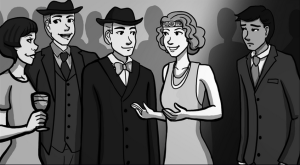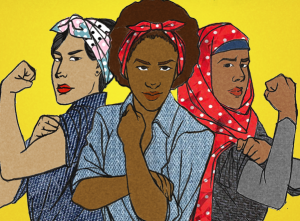
Source: EF
(Trigger Warning: Discussion of rape and victim-blaming)
Sexual violence is stigmatized in our society.
We live in a rape culture, which often makes survivors feel ashamed about their trauma. This leads to fewer people reporting their experiences to the police and fewer rapists being convicted.
For this reason, many anti-rape campaigns encourage survivors not only to say that they were sexually violated, but also to give accounts of their experience of sexual violence.
This can be very beneficial: For many survivors, speaking about sexual trauma can have a healing effect. Respectful discussions on sexual trauma can also aid in eradicating the stigma surrounding sexual violence.
I can personally testify to this: After being sexually violated, I found discussing sexual violence with others to be very therapeutic.
But the strong focus on story-telling has an unfortunate side-effect. Often, survivors are reduced to their stories. In other words, survivors’ stories are treated as “inspiration porn.” And this treatment of survivors is counterproductive.
It’s important that we’re aware of the ways in which survivors’ stories are used as inspiration porn, and how this harms survivors and perpetuates rape culture.
Firstly, a note about the language: I will use the word “survivor” to refer to people who have been victims of sexual trauma. This is because ”survivor” is currently the most commonly accepted term to refer to this group. That being said, I am someone who has experienced sexual violence, and I don’t personally identify with the term for a number of reasons: I support everyone’s write to identify however they want, but the term doesn’t describe my situation at all But that discussion is best left for another time, and for now, “survivor” is a useful general term.
Inspiration Porn
The term “inspiration porn” refers to stories that emphasize how individuals have overcome difficult circumstances and succeeded. It is often applied to disabled people and people from poor backgrounds who become successful.
The point of inspiration porn is not to help the subject heal, but rather, to inspire others. It aims to inspire awe in the “triumph of the human spirit” by emphasizing one central message: “If I can overcome my difficult circumstances, you can, too!”
The stories of survivors are sometimes reduced to inspiration porn.
Framing stories as inspiration porn focuses on making the audience feel inspired, rather than helping the survivor heal or helping the survivor get their opinion across.
Of course, sometimes survivors tell their stories to inspire and help others. When I give an account of my sexual violation and subsequent healing, I do so to heal, to help other survivors know that they’re not alone, and to inspire people to push back against rape culture.
The problem with inspiration porn is not the fact that it’s inspiring, but that we become socialized to look solely for inspiration in survivors’ stories.
Creating inspiration porn out of survivors’ stories perpetuates rape culture instead of fighting against it.
Let’s look at how.
1. It Dehumanizes Survivors
Rape is an extremely dehumanizing ordeal because one is treated as if their bodily autonomy doesn’t exist.
Without their consent, the victim’s body is used for another person’s gain. In this sense, rape is a denial of one’s personhood.
Turning a person’s story into inspiration porn further objectifies and dehumanizes the survivor.
This is because it appropriates the story for the gain of the audience while discarding the human being who experienced it. This has the potential to further one’s trauma.
2. It Perpetuates the ‘Perfect Victim’ Narrative
Certain stories about rape are celebrated more than others.
Activists often refer to what is known as the “perfect victim” narrative.
One of the most well-known first-person accounts of rape in my country, South Africa, is that of a survivor named Alison. She wrote a book called I Have Life, in which she outlines her assault in detail. Her attackers mutilated her and left her for dead, but against the odds, she managed to crawl to a nearby road and find help.
While I (of course!) feel empathetic towards Alison, I can’t help but wonder why her account is more well-known and successful than others.
Her story is popular because it conforms to the perfect victim narrative: it evokes horror, it evokes empathy for Alison, and most of all, the story inspires hope.
It does not challenge the rape myths society desperately clings to. It does not call on the reader to be introspective about the ways in which they might be complicit in rape culture. In many ways, her story reflects the “perfect victim” narrative because it’s incredibly difficult to victim-blame her.
Contrast this with stories of survivors who are not the so-called “perfect victim.”
Consider how society treats the stories of those who were raped while drunk, or survivors who are mentally ill, trans or gender non-conforming, queer, or perceived to be promiscuous (whatever that even means). You just have to glance through the comments on major news sites to notice that a certain kind of rape victim receives more empathy than others.
This isn’t a criticism of Alison and her story, but of the ways in which society selectively listens to survivors.
We victim-blame some survivors, and we praise and admire others.
This is because we look for a certain thing in rape narratives. We want to be inspired. We want to hear how the individual overcame their circumstances, not how society needs to change in order to eradicate those circumstances.
We want to hear that everyone can overcome suffering. We don’t want to take responsibility for creating a culture that perpetuates that suffering.
Inspiration porn is counterproductive because it encourages us to look for inspiration in survivors’ stories. We try to gain something from survivors instead of considering how we can better support them. When we don’t find inspiration, or when those stories make us feel uncomfortable, we disregard them.
If we listen to the stories of a variety of different survivors, we’ll begin to understand the complexities of sexual violence, healing, and rape culture. We’ll understand that survivors are not part of a monolithic, exclusionary group, and we’ll be more supportive towards those who are not “perfect victims.”
3. It Shames Other Survivors
When it comes to the stories of survivors, inspiration porn has the added effect of shaming other survivors.
As I mentioned earlier, many survivors – myself included – find it helpful to talk about our traumas.
But everybody heals differently.
Story-telling isn’t always necessary for healing.
When campaigns use rhetoric that imply that telling their story is the only way a survivor can heal and move forward, it prescribes how they should heal. Healing is a personal process that should be controlled by the survivor at their own pace, so this prescriptive attitude is problematic in that it’s disempowering.
It’s perfectly understandable why we value story-telling, but we shouldn’t imply that survivors who tell their stories are more valuable or otherwise “better” than others.
Sharing one’s experience of sexual trauma can be a very brave thing to do, but this doesn’t mean that survivors who choose not to tell their stories are cowardly.
Finding a Balance
Having said all this, speaking out about rape can still be very beneficial. It’s important that survivors are given the platform and support to tell their stories, if and when they decide to do so.
So how can we encourage survivors to speak about their trauma without reducing them to their stories?
Firstly, it’s important to ensure that the survivor feels comfortable enough to discuss their story on their own terms. They shouldn’t be forced or shamed into sharing their story.
Survivors should be allowed to share their story if, when, and how they want, but if they don’t want to share their story, that’s perfectly okay, too.
Secondly, when we listen to survivors, it shouldn’t be for self-gain. If you’re listening to a survivor share their story, don’t focus on what you could get out of it, but rather on how you could support them.
One example of activism that does it right is The Silent Protest. This is an annual protest which takes place in Grahamstown, South Africa.
The Silent Protest has a very survivor-centric approach. Those who are not survivors wear gaffer tape over their mouths for twelve hours, showing solidarity with survivors who are silenced by rape culture.
Survivors may choose to wear a purple t-shirt with the label “Survivor.” This year, the t-shirt said “Rape Survivor, And…” with a blank space below, in which the survivor could write whatever they liked.
The aim of this was to highlight the fact that a survivor’s identity is never entirely determined by their trauma – that we are multi-dimensional, complex human beings.
Survivors are given the opportunity to tell their stories, if they so wish.
What’s wonderful about this protest is that it challenges the stigma surrounding sexual violence without manipulating survivors into giving accounts of their trauma.
Survivors can participate at any level: No one is expected to share their story and nobody is expected to wear the “Survivor” t-shirt. The focus is entirely on survivors, who run and lead the protest. Non-survivors participate, but the point of the protest is very much focused on supporting the survivors.
The Silent Protest manages to protest against the silence surrounding sexual violence without turning survivors’ stories into inspiration porn.
***
In a society where sexual violence is stigmatized, speaking out about sexual violence is pretty revolutionary.
But there is a difference between encouraging people to tell their stories and manipulating them into doing so for someone else’s gain.
The key difference between the two, I believe, is respect.
[do_widget id=”text-101″]
Sian Ferguson is a Contributing Writer at Everyday Feminism. She is a South African feminist currently studying toward a Bachelors of Social Science degree majoring in English Language and Literature and Gender Studies at the University of Cape Town. She has been featured as a guest writer on websites such as Women24 and Foxy Box, while also writing for her personal blog. In her spare time, she tweets excessively @sianfergs, reads about current affairs, and spends time with her gorgeous group of friends. Read her articles here.
Search our 3000+ articles!
Read our articles about:
Our online racial justice training
Used by hundreds of universities, non-profits, and businesses.
Click to learn more



















